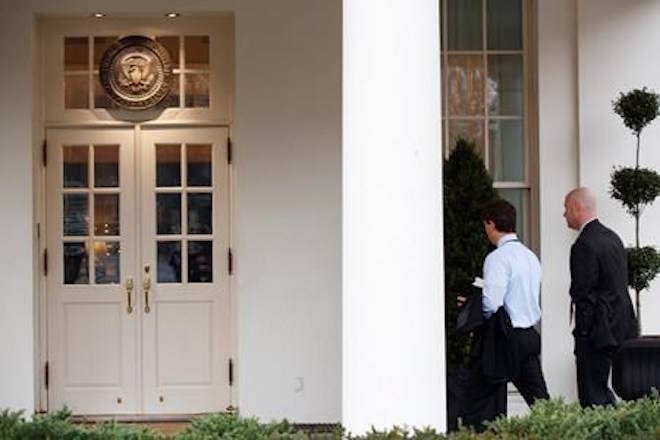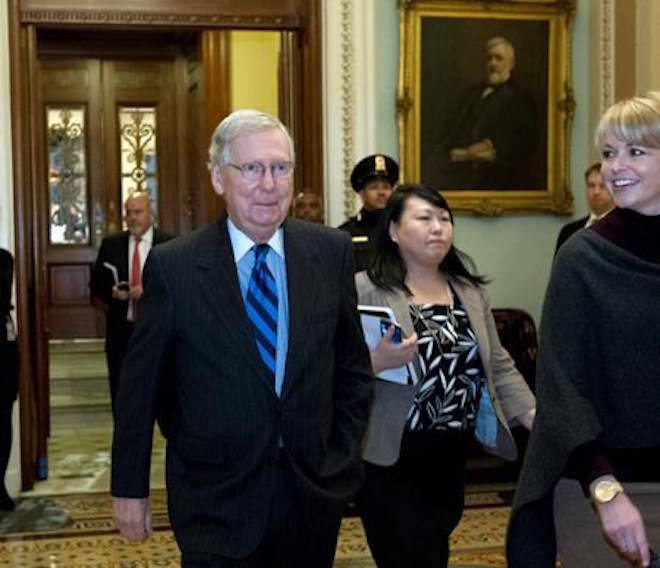The government shutdown is set to sow more disruption and political peril Monday after the Senate inched closer but ultimately fell short of an agreement that would have reopened federal agencies before the beginning of the workweek.
Senate Majority Leader Mitch McConnell and Democratic leader Chuck Schumer said negotiations lasted late into the night, with a vote to break a Democratic filibuster on a short-term funding bill scheduled for noon Monday. Under the proposal taking shape, Democrats would agree to a three-week spending measure — until Feb. 8 — in return for a commitment from the Republican leadership in the Senate to address immigration policy and other pressing legislative matters in the coming weeks.
But Democrats appeared to be holding out for a firmer commitment from McConnell. “We have yet to reach an agreement on a path forward,” Schumer said late Sunday.
McConnell’s comments followed hours of behind-the-scenes talks between the leaders and rank-and-file lawmakers over how to end the display of legislative dysfunction, which began at midnight Friday after Democrats blocked a temporary spending measure. Democrats have sought to use the spending bill to win concessions, including protections for roughly 700,000 younger immigrants brought illegally to the U.S. as children.
Republicans have appeared increasingly confident that Democrats were bearing the brunt of criticism for the shutdown and that they would ultimately buckle. The White House and GOP leaders said they would not negotiate with Democrats on immigration until the government is reopened.
President Donald Trump on Monday accused Democrats of prioritizing services and security for noncitizens over U.S. citizens. “Not good,” his first tweet said. In a second tweet, he said, “Democrats have shut down our government in the interests of their far left base. They don’t want to do it but are powerless!”
Trump’s first tweet appeared to undercut comments by his legislative affairs director, Marc Short, who told CNN that the immigrants in question are law-abiding and “productive to our society.” Short says the administration wants to “find a pathway for them” to stay in the U.S.
There were indications Sunday that Democratic resolve was beginning to waver, with growing worries that a prolonged shutdown could prove to be an electoral headache for the party just as it has grown more confident about prospects in November midterm elections.
Although they initially dug in on a demand for an immigration deal, Democrats had shifted to blaming the shutdown on the incompetence of Republicans and Trump, seeming sensitive to being seen by voters as willing to tie up government operations to protect immigrants.
Trump, who regularly disrupted negotiations in recent weeks, had been a relatively subdued player in the weekend debate. He has not appeared in public since Friday afternoon. The White House said he was in regular contact with Republican leaders, but he has not reached out to any Democrats, a White House official said.
Democrats are facing intense pressure from their base to solve the issue over the young immigrants, commonly referred to as “Dreamers,” and they are skeptical of Republicans’ credibility when offering to take up the issue. Whether Trump would back the emerging plan or any later proposal on immigration is an open question.
While lawmakers feuded, signs of the shutdown were evident at national parks and in some federal agencies. Social Security and most other safety-net programs were unaffected by the lapse in federal spending authority. Critical government functions continued, with uniformed service members, health inspectors and law enforcement officers set to work without pay.
Lawmakers were mindful that the political stakes would soar Monday morning, when thousands of federal workers would be told to stay home or, in many cases, work without pay. What was still a weekend burst of Washington dysfunction could spiral into a broader crisis with political consequences in November.
That threat prompted a bipartisan group of Senate moderates to huddle for a second day Sunday in hopes of crafting a plan to reopen the government. The group was set to meet again Monday morning.
The emerging approach found advocates in South Carolina Sen. Lindsey Graham, who has been trying to broker an immigration deal, and Kentucky Sen. Rand Paul, Republicans who rejected an earlier short-term proposal. GOP Arizona Sen. Jeff Flake, another previous no-vote, announced he would vote in favour of reopening the government Monday.
Graham said no deal had been reached by the moderate group because Democrats were not yet on board. “To my Democratic friends, don’t overplay your hand,” he told reporters. “A government shutdown is not a good way to get an outcome legislatively.”
The vote Monday will prove to be a test of unity and resolve among Democrats. Five Democrats from states won by Trump broke ranks in a vote Friday. The measure gained 50 votes to proceed to 49 against, but 60 were needed to break a Democratic filibuster.
___
Associated Press writers Kevin Freking and Catherine Lucey contributed to this report.
Alan Fram, Andrew Taylor And Zeke Miller, The Associated Press
Like us on Facebook and follow us on Twitter.




